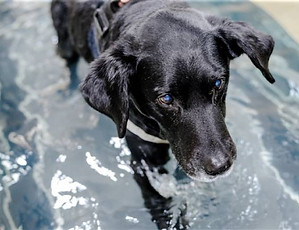Veterinary Physiotherapy

Veterinary physiotherapy is becoming more widely recognised as having an essential role to play in animal health and rehabilitation.
The overall aims of physiotherapy are to promote healing and restore normal function by
Aiding in pain management
Reducing inflammation
Improving and / or maintaining joint mobility
Building and / or maintaining muscle mass and strength
Improving balance, coordination, core strength and stability
Improving proprioception
Correcting compensatory gait patterns
Physiotherapy can be beneficial to both conservatively managed cases as well as surgical ones, and is designed to compliment any treatments or surgeries carried out by your veterinary surgeon.
It can also benefit young animals by helping them develop good body awareness and movement patterns, thereby reducing the risk of injury, and those animals that take part in competitive sports, such as agility, flyball, dock diving, showing etc., by helping to maintain fitness, enhance performance and reduce injury risk.
Therapies


Therapy is tailored to the individual animal and may consist of a combination of:
Manual therapies
Massage
Myofascial release
Passive range of motion exercises
Passive stretches
Active exercises
Active range of motion exercises
Active stretches
Core strength and stability work
Proprioceptive work
Electrotherapies
Therapeutic ultrasound
Pulsed electromagnetic field therapy
Photobiomodulation Therapy (low level laser therapy / red phototherapy)
Thermotherapies
Heat
Cold
Hydrotherapy treadmill
Walking though water
Passive & active exercises in the water environment
A home program is also provided to help support and continue your animals rehabilitation at home. Home programs may include advice on supportive exercises, proprioceptive enhancements, diet and lifestyle management.
Common conditions
There are a wide range of conditions affecting dogs (and cats) of all ages, from the very young to the older companion, that can benefit from physiotherapy treatment inlcuding, but not limited to:
Degenerative orthopaedic conditions
Osteoarthritis
Hip dysplasia
Elbow dysplasia
Osteochondrosis dissecans (OCD)
Neurological conditions
Chronic degenerative radiculomyelopathy (CDRM)
Fibrocartilagenous embolism (FCE)
Intervertebral disc disease (IVDD)
Syringomyelia
Pre and post orthopaedic and neurogical surgery
Spinal surgery such as for IVDD
Fracture repair
Cruciate ligament repair
Patella luxation surgery
Femoral head and neck excision (FHNE)
Hip replacement
Amputations
Soft tissue injuries
Muscle, tendon, ligament tears and strains
Wounds
Reduced function, general stiffness and / or weakness in older animals
Muscular imbalances
Muscle atrophy
Asymmetric muscle development
If you are unsure as to whether your animal will benefit from treatment please get in touch.